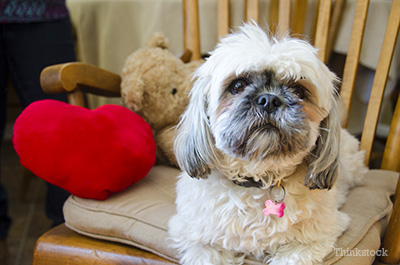Dr. Phil Zeltzman is a traveling, board-certified surgeon in Allentown, PA. His website is www.DrPhilZeltzman.com. He is the co-author of “Walk a Hound, Lose a Pound” (www.WalkaHound.com).

Lung Surgery
Denali*, a 14-year-old Shih Tzu, had surgery about six months ago to remove a large lung tumor.
We performed open chest surgery to remove the lung. Denali recovered very well and went home after a couple of days. A week later, the biopsy results confirmed my suspicion: the tumor I had removed was malignant (remove ‘cancerous’) (called bronchoalveolar carcinoma).
Chemotherapy treatment
Denali’s owner was thoroughly dedicated to her dog and elected to do everything she could to increase his longevity, while maintaining his quality of life. She elected chemotherapy. Denali did very well, as many pets do. He went through chemo like a champion.
Six months later, Denali, who was now 15 years old, went to the groomer to get a haircut. She noticed a firm swelling on the right side of his anus. Fortunately, the groomer encouraged Denali's owner to check in with her family veterinarian.
Rectal tumor in a senior dog
The news was not good. A rectal exam revealed that the very firm mass was larger than a cherry (in a Shih Tzu!) and appeared to stem from the anal sac.
Almost invariably, these tumors are cancerous and aggressive. It was actually quite shocking that this cancerous tumor appeared in spite of chemotherapy. But of course, Denali’s chemo was not meant to prevent another type of cancer from popping up. The chemo protocol was designed to help with the lung tumor, not with any other type of cancer.
The ethical dilemma of additional cancer treatment
When I met Denali’s owner, we realized that we were facing a huge ethical dilemma. Was it fair to remove a cancerous tumor that wasn’t causing any problems yet (but shortly would) in a 15-year-old patient? Was it reasonable to perform another surgery in a cancer survivor who had a lung tumor removed only six months ago? Was it realistic to spend so much money on a geriatric dog?
Were we truly doing this to help the patient? This was really not an easy decision for either one of us to make. Sure, my job is to fix patients, but this was a difficult ethical dilemma. What was I to do?
Denali’s owner made the decision to go ahead with surgery. She loved her dog and felt that this was the right thing to do to help him continue living a happy and comfortable life.
I accepted the challenge.
The results of treatment
We performed surgery on Denali. Again, he recovered very well and went home the next day. About a week later, the biopsy results arrived. Convinced that it would be the classic anal sac cancer, I could not believe my eyes while reading the report: the tumor was benign!
It was a benign tumor of the anal sac called an adenoma. This was a first for me! There was a minuscule chance that this tumor would be benign, and it was!
I immediately called Denali’s owner, who couldn’t believe her ears. She was thrilled about the results, and ecstatic about making the right decision for her dog. Her gamble paid off.
This story is a great reminder that:
- Anesthesia risks can be managed, even in an older patient
- Surgery is not the enemy. The tumor is the enemy. (This is one of my favorite sayings.)
- When pet owner and surgeon are on the same page, good things usually happen.
- I’m happy to report that several months after surgery, Denali is still going strong.
* The patient’s name was changed to protect his privacy, but the story is entirely true.
If you have any questions or concerns, you should always visit or call your veterinarian -- they are your best resource to ensure the health and well-being of your pets.
